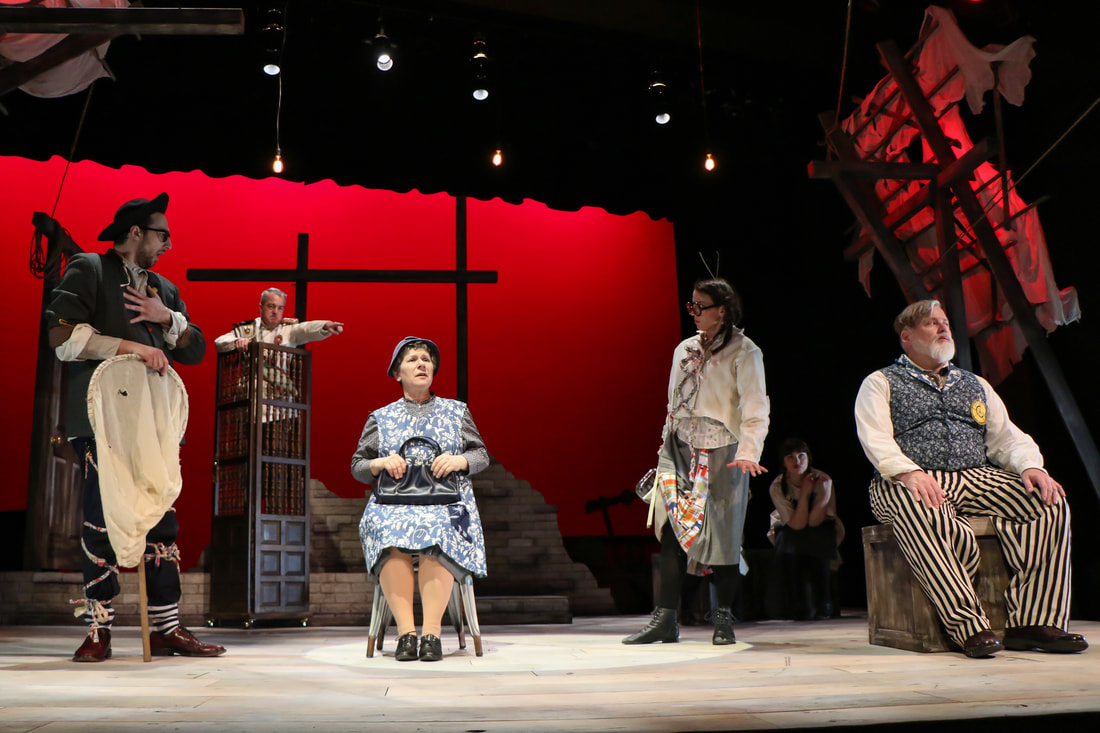|
Early 20th century political satire The Last Cyclist remains tragically prescient decades after it was first written in a Jewish ghetto under the oppression of the Nazis. The staging at Cardinal Stritch this month cleverly reflects the alarmingly persistent truth: those with the right influence a can rise to power by finding an enemy that the public can agree to. A diverse ensemble under the direction of Mark Boergers glides through a tale of ignorance, hatred and cruelty in a dramatic presentation animated by dark humor that reflects current events.The script is written by Naomi Patz based on an original cabaret by Karel Švenk. The opening of the play firmly anchors the play in history. Inhabitants of the Terezin Ghetto gather for the final dress rehearsal of The Last Cyclist. Scenic Greg Kaye makes impressive use of old wooden chairs, crates and flowing white sheets to invoke the feeling of a dilapidated ghetto. The full breadth of the spacious Nancy Kendall Mainstage Theater is barricaded off by the scenery, giving a kind of thematic immersion in the aesthetic of a walled-off ghetto. Sarah Burger's sound design adds to the atmosphere as the audience files in to the show. There's the sound of a small village pulsing through the theatre. Joel Kopischke plays a humbly heroic figure bringing together people living in awful conditions to perform a narrative that might give them some sense of insight in the squalor of their lives under Nazi oppression. Kopischke plays a hero of a different kind as the play settles-in. In the play within the play, Kopischke is a grocer who is in love with a woman he finds himself incredibly nervous around. Laura Monagle endearingly plays his love interest in a few remarkably sweet scenes that serve as a central emotional compass for the show. Villainy enters the picture in the form of a cynical, avaricious figure played with deliciously casual arrogance by Marcee Doherty-Elst. A quick discussion with a few others suggests that bicycle riders might be the source of all the ensemble’s problems—an assertion backed-up by Randall T. Anderson as an equally cynical figure who seeks power and authority of his own. The two central authority figures are backed-up by a host of lunatics. At the center of the lunacy are a couple of playfully mad underlings played with alarming charm by Maggie Marks and Nick Narcisi. The fun playfulness of Marks and Narcisi allows the despicable nature of what they’re doing to feel like in inconsequentially silly game until things start to look dark and foreboding for our hero. Thus is the complexity of totalitarianism brought into strikingly simple clarity for a provocatively concise intermission-less evening at the theatre. The basic plot of the story is so primal and simplistic that it could echo into nearly any era. All that would be needed here is the demand to build a wall to keep out the cyclists, and The Last Cyclist would be a chillingly contemporary satire on the current administration. Adaptations of The Last Cyclist could be done in every language on the planet on stages all over the world and it would be as pertinent as it is here. (I'd love to see a version of the satire done entirely in Spanish on the US-Mexico Border.) It’s disturbing that something as ugly as institutionalized persecution still feels so relevant. It’s that disgustingly enduring relevance that keeps The Last Cyclist so very, very important. The Last Cyclist runs through April 14th at Cardinal Stritch on 6801 N. Yates Road. For ticket reservations and more, visit Cardinal Stritch online. The show is presented by Cardinal Stritch University, The Nathan and Esther Pelz Holocaust Education Resource Center (HERC) and The Harry and Rose Samson Jewish Community Center.
0 Comments
Leave a Reply. |
Russ BickerstaffArchives
July 2024
Categories |

 RSS Feed
RSS Feed
